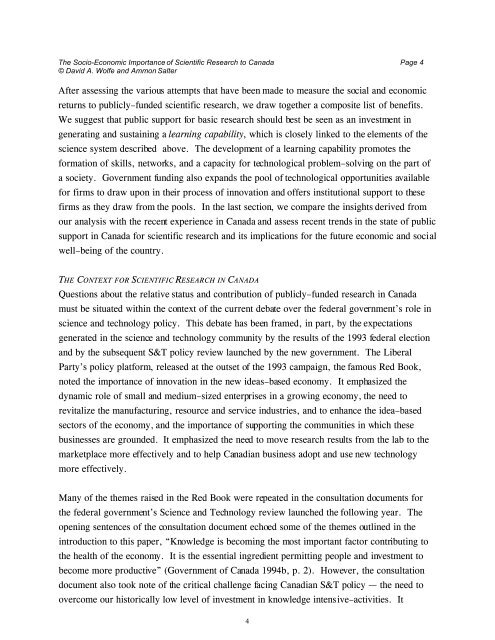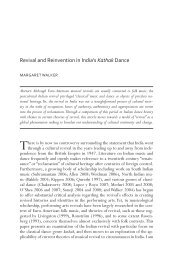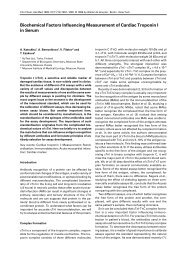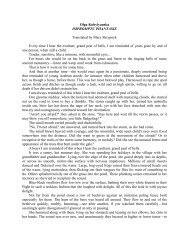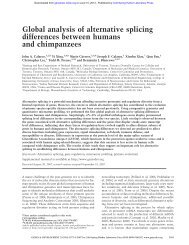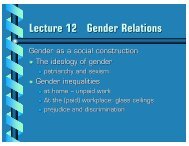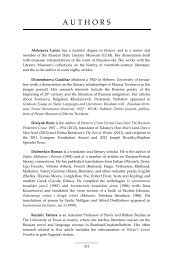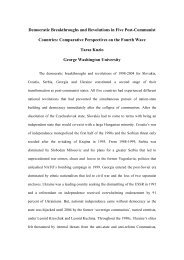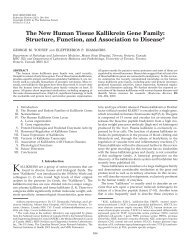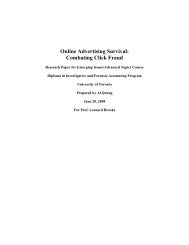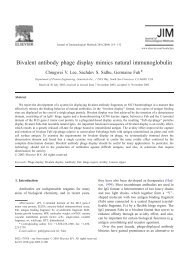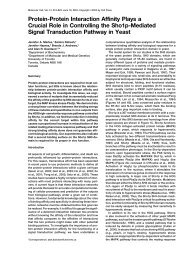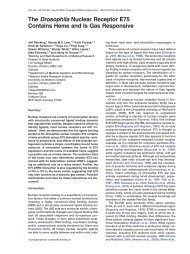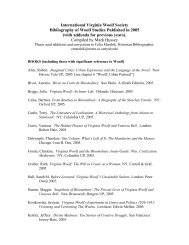The Socio-Economic Importance of Scientific Research To Canada
The Socio-Economic Importance of Scientific Research To Canada
The Socio-Economic Importance of Scientific Research To Canada
Create successful ePaper yourself
Turn your PDF publications into a flip-book with our unique Google optimized e-Paper software.
<strong>The</strong> <strong>Socio</strong>-<strong>Economic</strong> <strong>Importance</strong> <strong>of</strong> <strong>Scientific</strong> <strong>Research</strong> to <strong>Canada</strong> Page 4© David A. Wolfe and Ammon SalterAfter assessing the various attempts that have been made to measure the social and economicreturns to publicly–funded scientific research, we draw together a composite list <strong>of</strong> benefits.We suggest that public support for basic research should best be seen as an investment ingenerating and sustaining a learning capability, which is closely linked to the elements <strong>of</strong> thescience system described above. <strong>The</strong> development <strong>of</strong> a learning capability promotes theformation <strong>of</strong> skills, networks, and a capacity for technological problem–solving on the part <strong>of</strong>a society. Government funding also expands the pool <strong>of</strong> technological opportunities availablefor firms to draw upon in their process <strong>of</strong> innovation and <strong>of</strong>fers institutional support to thesefirms as they draw from the pools. In the last section, we compare the insights derived fromour analysis with the recent experience in <strong>Canada</strong> and assess recent trends in the state <strong>of</strong> publicsupport in <strong>Canada</strong> for scientific research and its implications for the future economic and socialwell–being <strong>of</strong> the country.THE CONTEXT FOR SCIENTIFIC RESEARCH IN CANADAQuestions about the relative status and contribution <strong>of</strong> publicly–funded research in <strong>Canada</strong>must be situated within the context <strong>of</strong> the current debate over the federal government’s role inscience and technology policy. This debate has been framed, in part, by the expectationsgenerated in the science and technology community by the results <strong>of</strong> the 1993 federal electionand by the subsequent S&T policy review launched by the new government. <strong>The</strong> LiberalParty’s policy platform, released at the outset <strong>of</strong> the 1993 campaign, the famous Red Book,noted the importance <strong>of</strong> innovation in the new ideas–based economy. It emphasized thedynamic role <strong>of</strong> small and medium–sized enterprises in a growing economy, the need torevitalize the manufacturing, resource and service industries, and to enhance the idea–basedsectors <strong>of</strong> the economy, and the importance <strong>of</strong> supporting the communities in which thesebusinesses are grounded. It emphasized the need to move research results from the lab to themarketplace more effectively and to help Canadian business adopt and use new technologymore effectively.Many <strong>of</strong> the themes raised in the Red Book were repeated in the consultation documents forthe federal government’s Science and Technology review launched the following year. <strong>The</strong>opening sentences <strong>of</strong> the consultation document echoed some <strong>of</strong> the themes outlined in theintroduction to this paper, “Knowledge is becoming the most important factor contributing tothe health <strong>of</strong> the economy. It is the essential ingredient permitting people and investment tobecome more productive” (Government <strong>of</strong> <strong>Canada</strong> 1994b, p. 2). However, the consultationdocument also took note <strong>of</strong> the critical challenge facing Canadian S&T policy — the need toovercome our historically low level <strong>of</strong> investment in knowledge intensive–activities. It4


